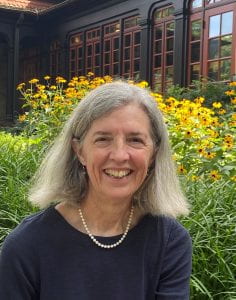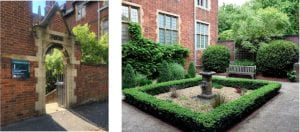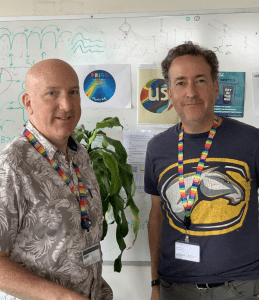Professor Leslie Zarker Morgan is Professor Emerita of Italian and French at Loyola University Maryland. She visited the University of Bristol as a Benjamin Meaker Distinguished Visiting Professor for part of February and March 2024 at the invitation of Professor Marianne Ailes. The visit involved presenting the difficulties of working with the mixed medieval language Franco-Italian and collaborating on introductory materials for the Centre for Medieval Studies to help prepare students for reading and interpreting that branch of romance epic.
Professor Ailes invited me to Bristol to present challenges both in working with the non-standard medieval language mixture Franco-Italian as well as in interpreting versions of those texts produced by scholars, since French and Italian traditions in medieval text editing differ substantially. In working with her and the University of Bristol Library, I provided a local bibliography for those wishing to work in the field, as well as offering a workshop where we examined such materials and discussed their pros and cons together with students and colleagues. These materials will furnish pages for the virtual learning platform (Blackboard) of the Centre for Medieval Studies “Introduction to Medieval Languages” on which we have already begun to work.
I was pleased to have the opportunity also to revisit an earlier project, the Geste Francor, a fourteenth-century Franco-Italian epic chronicle about Charlemagne’s family in chanson de geste form, to present it particularly to students, but also to colleagues, in a more complete format than is normally possible in conference papers (of 20 minutes). Preparing the talk, in fact, resulted in an interesting finding that will be the subject of a paper about the Geste.
Finally, my current project concerns epic humor, something about which Professor Ailes has herself written, as have several other colleagues in the area who attended the talk. After the talk, we discussed the linguistic approach that I proposed, and other aspects of humor and how to analyze them. These discussions will be helpful as I develop the monograph in progress.
Staying at the University of Bristol was a wonderful experience: the lodgings at the Principal’s House provided by the International Research Development Team were perfect: at the center of the University, whence it was easy to participate in numerous events on campus, such as other lectures, and easily meet colleagues for lunch or coffee as well as explore the city itself. I have never had such a short commute to the office! The IT service was extremely helpful in getting me quickly online at the University, the Staff Residential Lettings Office and Staff were very helpful in getting me set up in the apartment. I look forward to continued contact with colleagues and friends at the University of Bristol in the future and collaborating on further projects.
Professor Leslie Morgan




